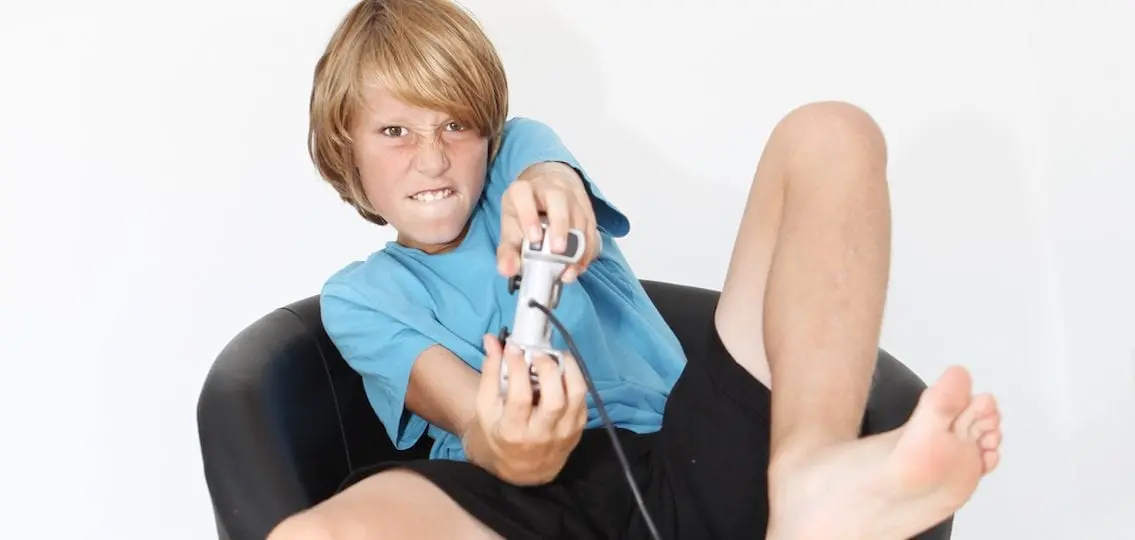Parenting is more than feeding, housing, clothing, and loving your children. It’s making thousands of decisions along the way including how they spend their free time. In a world full of imbalance, it’s our job to provide it until our kids learn to do it for themselves.

Then there’s Fortnite.
Setting Fortnite Boundaries
Parents will know my pain. Fortnite is like the loud, annoying house guest who just won’t leave. Despite the hard and obvious hints to the point we’re ready to literally kick him to the curb.
When I chat with other parents, the conversation quickly turns to Fortnite. The obsession, the bad moods kids would have when they weren’t allowed to play, and how to effectively limit it without banning it outright.
My husband and I curbed our son’s time on the game by using a timer. But we have three other kids, including a 6-year-old, so that wasn’t working well. We also faced the challenge that my son could see his friends playing the moment he turned on the X-box. I found myself saying the same thing my mother said to me, “I don’t care what those kids do, I care about you!”
During the summer, I limited his screen time to a total of two hours a day, which meant any screen—video game, phone, TV. But that sometimes crept up to more because I was distracted by conference calls or dealing with one of my other kids.
Too Much Fortnite
As a parent, I consider any time in front of a screen as a personal parenting failure to the point it keeps me up at night, furious at myself for not doing better or even allowing it. It’s a work in progress to strike the right balance as I realize this is a way kids socialize. Despite this, one thing was perfectly clear: the more screen time, the greater the crabbiness in my kids. There was a clear and direct correlation between screen time and orneriness and other parents reported the same.
One day, after flicking the lights on and off to the basement playroom to get his attention that he was now a half hour past his time limit, I finally lost it “Mommy Dearest” style. Instead of throwing wire hangers, I grabbed a big canvas bag and collected every single remote, gadget, and even the keyboard to the computer, and then ordered him to do something creative.
His response? He threw a blanket over his head.
Like a crazed woman, I hauled my big canvas bag with cords and keyboard hanging out the side and took it to my car to run some errands.
When I arrived back home, he had done some reflection. The blanket was off his head, his mood was better, and he was making sandwiches for his brothers. We talked about his reaction and behavior, and he agreed he was acting like a jerk.
Controlling Fortnite
An intervention was needed, so the new deal was no Fortnite during the school week and very limited use on the weekends. So far it has worked, and I’ve seen an improvement in his mood.
Sometimes during the week, he will ask me to play, and I take those requests on a case-by-case basis. He’s a kid who spends a lot of time outside and doing other things. He’s doing well in school, always does his homework, and helps around the house, so sometimes I’ll say yes, but often it’s a no. He then moves on to another activity, such as learning how to cook!
Now, our routine every Sunday evening goes like this: I collect all remotes in my big canvas bag just to ensure there’s no temptation. It’s not that I don’t trust him, but I know if I have junk food in the house, I’ll eat it. Wine? I’ll drink it. Without the remotes and access, it takes temptation off the table. The rule is now met without qualms.
Things have been noticeably better since we’ve curbed Fortnite. Our son’s attitude has improved, he seems happier, and I’m glad he’s not glazed over staring at a screen. Of course, I still hate it. I’d love to get rid of Fortnite. But, as with other phases, I know he won’t be playing it forever, and then we’ll be on to the next parenting challenge.

Everything in moderation, though I still want to take a bat to that game console.



